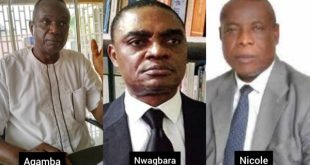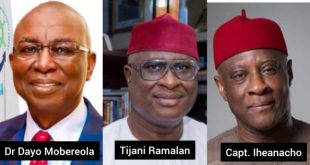By Babajide Okeowo

Collapsed quay aprons, poor and dilapidated port access roads as well as congestions, the challenges of decaying port infrastructure in Nigeria are too numerous to recount.

Over the years, seaports in Nigeria including the Lagos Port Complex, Apapa, Tin Can Island Port Complex, Calabar Port, the Delta Warri Port, Lekki Port, Rivers Port, and the Onne Port also in Rivers State, among others have suffered varying level of decay.
To this effect, stakeholders in the Nigerian Maritime industry gathered to explore workable solutions to these myriads of challenges that have rocked the industry.

The Managing Director of the Nigerian Ports Authority (NPA) Mohammed Bello-Koko identified successive decades of neglect, the cost and technical implication for fixing port infrastructure deficit which outweighs the Authority’s budgetary provision as some of the factors that have contributed to the decay.
Dr. Eugene Nweke, former President of the National Association of Government Approved Freight Forwarders (NAGAFF) expressed the need for urgent attention to the critical infrastructure at seaports and suggested declaring a state of emergency.
He emphasized that ports play a vital role in the nation’s economy and trade facilitation, and inefficiencies in the port system result in costly delays for ship owners.
“The issue of ports infrastructure is something that should be concerning to all. This should not be treated as a blame game between all concerned but should be seen as a national issue that requires urgency.
In fact, it wouldn’t be too much to say declare a state of emergency on the issue” he interjected.
The President-General of the Maritime Workers Union Of Nigeria (MWUN) Prince Adewale Adeyanju laments poor ports access roads, congestion, and the presence of those who shouldn’t be in the ports that are there as some of the challenges facing ports infrastructure.
He particularly blamed terminal operators for not doing the needful in fixing the collapsing infrastructure since they are the tenants in the ports while also blaming the appointment of non-industry professionals as the heads of some maritime agencies.
“If you reside in Port-Harcourt, it will take you four to five hours to get to the Onne Port, it is as bad as that.
The lives of our members in the ports are at stake. Coming from Festac to the Port in Tincan Island or Apapa Port might take as long as 3 hours to get there, it is as bad as that” he started.
Adeyanju also blamed the terminal operators for not taking care of the facilities given to them by the Federal Government to manage.
“It is only a few of the terminal operators that you can access their terminals. To this effect, the dockworkers are going to withdraw our services from Five Star Logistics Limited because of the quay apron that has been dilapidated for so many years now”.
‘Our port roads have been taken over by Mechanics, Vulcanizers and I keep saying that they’ve even erected two-bedroom flats on the road and it is almost impossible as a port worker to even drive on the roads at night due to the population of the children of these artisans who throng the roads at night’ he further complained.
He added that the collapsing quay aprons at Tin Can, and dilapidated port access roads leading to Apapa, Onne and Calabar as a problem that would not have been if technocrats were appointed to port regulatory agencies, he cited DG of Nigerian Maritime Administration and Safety Agencies NIMASA Dr. Bashir Jamoh and former Executive Secretary of Nigeria Shippers Council NSC Barr Hassan Bello as good examples who were industry players before rising to lead their respective agencies.
Addressing the infrastructural decay, Bello-Koko, who was represented by the General Manager, NPA Managing Director’s office, Mr. Ayodele Durowaiye, stated that the issue has become a top priority on the Agency’s Infrastructural Renewal Agenda.
He noted that the Authority is exploring numerous funding alternatives to address port infrastructural challenges, including Public-Private Partnerships (PPP).
He observed that Tin Can and Apapa ports account for over 60 percent of the nation’s cargo traffic annually while expressing regret that the TCIP port facility has been overstretched since it was established in 1977.
“The problem of collapsed quay aprons at Tin Can Island Port is top on the NPA Infrastructural Renewal Agenda of the Authority as the port has been operating far above its in-built capacity for decades,” he said.
“I am glad to inform this distinguished gathering that we are at conclusive stages of discussion with local and international partners with the requisite financial and technical competence to fund the Tin Can Port reconstruction project”.
“In the meantime, we are fixing what is within our capacity like the recently commissioned Control Tower at Tin Can Port” he disclosed not without adding that measures have also been taken to forestall port infrastructure decay before intervention with the new Concession Agreements which ensures that all parties to the agreement would be alive to their responsibilities, especially as it concerns infrastructure maintenance.
For Dr Temisan Omatseye, former Director General, Nigerian Maritime Administration and Safety Agency (NIMASA) the Federal Government must appreciate the value of riverine transportation in Nigeria to take off the pressure on roads, decongest the port access roads and preserve ports infrastructure.
He called on NPA to enter into a Joint Venture (JV) with the Barge Operators Association of Nigeria (BOAN) to ensure that cargoes are moved by waterways which will ease traffic on the roads, and reduce costs.
“How will this work? A mother vessel can still come to Tincan Island and discharge. The cargo can still be cleared by customs, thereafter, the barge operators and shipowners begin to feed other ports in the hinterland.
“I believe strongly that no terminal operator should be allowed to operate in Lagos except they have a waterfront jetty and let everybody move to Epe or Ikorodu.
“Epe has good road access, and I don’t know why we cannot go to Ijebu waterside and build a terminal and get Ondo state government to do dual carriage to Ore so that they don’t need to come to Lagos.
“He noted that the Nigerian Ports Authority (NPA) was losing money because cargoes now move to other ports due to inefficiency not at their own doing but because people experience delay in the discharge of cargo”.
“Shipping is very dynamic and so NPA should step into the realm of business if the Nigerian Maritime Administration and Safety Agency cannot do it through their Cabotage Vessel Financing Fund.
“NPA has the power to do a Joint Venture with barge operators and bring first-class equipment. There is a need to get smaller feeder vessels that can do 5.9 meter draft into places like Warri, Koko and Oghara to push cargo to places like Calabar and other areas, it is negotiable.
“If we look at the cost of moving trailer from Lagos to Onitsha, it cannot be as far much as moving by water to port in Warri,” he said.
He pointed out that presently, the Tincan Island Port had become the mess that it is because the country was dependent on a single port while adding that the infrastructure in Lagos state ports was in a state of collapse due at no fault of the port but because everybody wanted to come to Lagos.
“Most of the vessels are not interested in going there and that is why everybody is coming to Tincan or Apapa port and now they are looking at Lekki Deep Seaport.
“And we are basically transferring the problem of Apapa to Lekki. Really and truly, we need to find the solutions, we are Nigerians and we cannot imagine the impact the degradation of the port roads is costing us.
“When a truck is going to pick up a container, it will charge demurrage and the cost of the demurrage will be added to the cost of goods. And so, we should ensure that the ports infrastructures are in good condition,” he said.
 MMS PLUS NG – Maritime, Aviation, Business, Oil and Gas News Online Newspaper with coverage in Maritime, Oil and Gas, Aviation, Power and Energy as well as Financial News
MMS PLUS NG – Maritime, Aviation, Business, Oil and Gas News Online Newspaper with coverage in Maritime, Oil and Gas, Aviation, Power and Energy as well as Financial News









